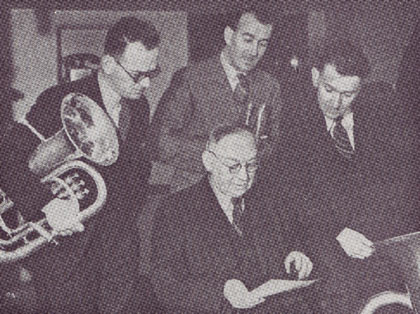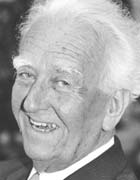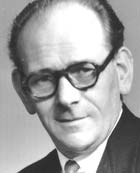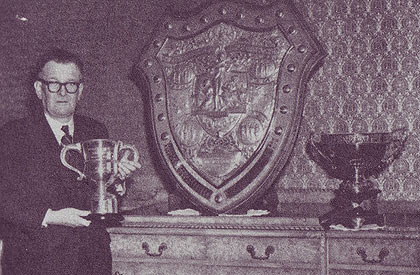Brotherly Love - The Mortimer boys in battle
8-Feb-2007The competitve urge is sometimes at its most severe when it comes to brothers - it certainly was with the Mortimers.
There is no more acute sense of competition as that found between brothers. Sisters don't hack it – they have too much common sense.
Be it in politics, sport or even music, it is the male side of the family tree that seems to enjoy the competitive urge to out do each other most. It is a peculiar anthropological twist that at certain times and in certain spheres of life, brothers tend to follow each others instincts and ambitions, leading to a heightened sense of competition that invariably culminates in excellence and achievement but can also lead to destruction and a great deal of family sadness too.

Instilling the competitive elements: Fred Mortimer and his trio of sons
The names are familiar to us all: the Kennedy and Bush brothers in politics, the Schumacher and Grace families in motor racing and cricket, the Marsalis and Gershwin brothers in music. True, you can point out the likes of the Williams sisters in tennis, but no distaff pairings have had that almost visceral intensity in the heat of competition such as say, the Charlton brothers toe to toe against each other for Leeds and Manchester United, or as in the pursuit of commercial success, the brothers Dassler from Germany, who strove so hard to better each other in producing football boots and training shoes for their own companies Puma and Adidas that they never spoke for over 40 years and even split their home town in two!
Some rivalries have been evenly matched as the family talent has been poured with almost equal measure into the brotherly veins, whilst others have been horrendously one sided: No one could argue that the younger Schumacher brother has a pint pot of talented blood in his body compared to his older brother.
The Mortimers and Childs
In its own way the brass band world has had its own creative sibling rivalries too – most notably in the past with the three sons of Fred Mortimer – Harry, Alex and Rex, and currently with the two sons of John Childs - Robert and Nicholas.
There have been others of course, such as George and Jim Thompson, the Gregson, Howarth and Farr brothers, but none has achieved so much at the highest competitive level as these off spring. The level of their success, was, and continues to be quite remarkable, and is both worth remembering in the Mortimer's case and savouring in that of the two Welshmen.
The seeds of the competitive element were sown in the three Mortimer's from an early age. Fred Mortimer was a stickler for excellence (he was something of a martinet in discipline) and instilled that into his sons right through their formative years until good fortune meant that all three became integral members of what was to become the singularly most successful band in the world of its time – Fodens Motor Works. It also became a rivalry that at times was inspired, at others (and many sources confirm this) that led to quite considerable family alienation.
Harry (1902 – 1990) was joined by Alex (1905 – 1976) and Rex (1911 – 1999), and until the advent of the Second World War they were the triumvirate that provided the band with the cornerstone of its success. After the War the itch to follow their father's conducting footsteps soon took hold.
The First
Harry was the first (and in fact started in the pre war period when he conducted in competition against his father at the British Open). In another twist on family competitiveness, Fred perhaps knew his time as the dominant musical force in the family was coming to an end, and he made just three more appearances at the Nationals after the War, taking his final bow in 1948 directing Scottish Co-op out of the prizes. He had done battle with his eldest son four times at London and never beat him, whilst at the Open they battled four times also, with the father beating the son only once (in 1938).
Alex meanwhile took to the baton with Black Dyke as Bandmaster in 1949 and made his first appearance at the London Finals in 1951 when he got one over his older brother by not only beating him, but by winning as well. (Harry had to settle for 2nd and 4th places).
Over the next five years at the contest they faced up to each other - Alex with Black Dyke again in 1952 and 1953 and with CWS Manchester in 1954 and 1955, Harry with a phalanx of bands at his disposal (he conducted five on stage on his last appearance in 1955) to ensure he added to his tally of victories. By the time Harry had his fill, the head to head score at London was Harry with 4 wins to Alex's 1.
 At Belle Vue they met in battle just three times. Alex made his debut at the contest with Black Dyke in 1952 (Harry already had seven wins under his belt by then) and although he went on to record two victories at the contest (1960 and 1966) he never beat Harry when the two met on stage. In 1952, Harry came 2nd with two bands unplaced, whilst Alex came 5th, whilst the following year Harry came 2nd and 5th with 1 band unplaced, whilst Alex came 3rd with one other band out of the prizes. The final confrontation came in 1956 when Harry won with Fairey and Alex came runner up with CWS Manchester.
At Belle Vue they met in battle just three times. Alex made his debut at the contest with Black Dyke in 1952 (Harry already had seven wins under his belt by then) and although he went on to record two victories at the contest (1960 and 1966) he never beat Harry when the two met on stage. In 1952, Harry came 2nd with two bands unplaced, whilst Alex came 5th, whilst the following year Harry came 2nd and 5th with 1 band unplaced, whilst Alex came 3rd with one other band out of the prizes. The final confrontation came in 1956 when Harry won with Fairey and Alex came runner up with CWS Manchester.
Waiting in the wings
All this time, the youngest brother Rex was waiting somewhat reluctantly in the wings. A Fodens man through and through, he took up the bandmasters baton in 1953 and became MD in 1956 (following on from Harry himself).

Well worth the wait: Rex Mortimer enjoys his one British Open win
He made his debut at London that year after Harry made his final appearance in 1956, so never pitted his musical wits against him there. At Belle Vue it was the same as Harry had something of a dispute with the BBC who didn't wish him to conduct at the major contests due to his senior position in the organisation. With him no longer at the helm (he was in Australia at the time) Fairey's under Major Willcocks took a famous victory - with Alex fuming to such an extent that he quipped that even from 12,000 miles away his brother had managed to still beat him!
It also meant that the three sons never played against each other at the two major contests in the brass band calendar. Harry against Alex, Harry against Rex, Rex against Alex – but never all three together – what a contest that would have been.
That left the battle to continue between the two younger sons and a great battle it proved to be over the following years until both made their final appearance at the Nationals in 1972, although Rex soldiered on at the Open for two more years.
From 1956 to 1972 Alex and Rex challenged each other at the Royal Albert Hall on 10 occassions, although both made additional appearances when one or the other wasn't in the other corner so to speak.
First blood
Rex drew first winners blood in 1958 with Fodens on ‘Variations on the Shining River' - Alex had to be content with coming second with CWS Manchester. In the previous two years he had taken the honours but neither had won (something which perhaps meant little to them given the nature of their father's famous saying about winners and losers).
Alex returned the favour in 1962 when he won with CWS on ‘The Force of Destiny' but the following year Rex and Fodens didn't qualify and so Alex's victory was tempered somewhat. Even though CWS Manchester remained a force at the contest until 1969 Fodens were but a shadow of their former selves and never again made it to the prizes under Rex's baton.
Fate had one final twist for them both though as in 1970 and 1971 they took their bands into battle at the World Championships only to find that neither could win a contest that would have given them family bragging rights even over Fred and Harry's achievements.
Final appearances
The final appearances at the Royal Albert Hall came in 1972 when Alex drew number 3 with CWS Manchester and Rex number 18 with Fodens, but their time had passed and neither had a valedictory performance of note to deliver as both came out of the prizes.
At the British Open the younger brothers first clashed in 1962 and went on to battle each other for the famous gold trophy on a further seven occasions. Rex won his only British Open title in 1964 whilst his brother was missing, whilst Alex did beat Rex when he won it in 1966. Both had further relative success with Alex and CWS usually coming out on top in the chase for the minor prizes, but it was Rex who had the last laugh (although one suspects not a great one) when he came 5th in 1972 in what proved to be Alex's last appearance.
It was also the last time that the Mortimer name appeared in the prizes as in the following two years Rex and Fodens struggled to make any kind of mark and in 1974 off the early number 3 draw, Rex took his, and the family's final bow at the contest they had graced for so long and with so much success.
All in all the Mortimer brothers will most probably never be beaten, although the two Childs brothers will, we are sure, try their very best. In the end though it remains a quite amazing list of achievement.
Records
Harry won 9 National titles and 9 British Opens. In addition he also won 16 regional titles too (6 with Morris Motors, 3 each with Fairey and Fodens and 2 each with Black Dyke and Munn & Feltons).
Alex won 3 National titles and 2 British Opens. In addition he also won 13 regional titles (9 with CWS Manchester, 3 with Scottish Co-op and 1 with Black Dyke).
Rex won 1 National title and 1 British Open. In addition he had the 1 win at the regionals with Cammell Laird in 1964.
It was indeed an end of an era.
Iwan Fox
The Mortimer Records at the National Finals and British Open (1945 - 1974)
|
|
|
Nationals |
|
|
British Open |
|
|
Year |
Harry |
Alex |
Rex |
Harry |
Alex |
Rex |
|
1945 |
1st |
- |
- |
1st/3rd |
- |
- |
|
1946 |
2nd |
- |
- |
1st/2nd |
- |
- |
|
1947 |
1st/2nd |
- |
- |
1st/5th/6th |
- |
- |
|
1948 |
1st (3) |
- |
- |
2nd (1) |
- |
- |
|
1949 |
1st/2nd (1) |
- |
- |
1st |
- |
- |
|
1950 |
1st |
- |
- |
1st |
- |
- |
|
1951 |
2nd/4th |
1st |
- |
6th |
- |
- |
|
1952 |
1st/2nd/5th |
3rd |
- |
2nd (2) |
5th |
- |
|
1953 |
1st/6th (1) |
(1) |
- |
2nd/5th (1) |
3rd (1) |
- |
|
1954 |
1st/3rd (1) |
2nd |
- |
- |
5th |
- |
|
1955 |
1st/5th/6th (2) |
3rd |
- |
- |
3rd |
- |
|
1956 |
- |
2nd |
5th (1) |
1st |
2nd |
- |
|
1957 |
- |
2nd |
4th (1) |
- |
- |
3rd |
|
1958 |
- |
3rd |
1st |
- |
- |
4th |
|
1959 |
- |
(2) |
3rd |
- |
- |
(1) |
|
1960 |
- |
5th/6th (1) |
(1) |
- |
1st/5th |
- |
|
1961 |
- |
2nd |
6th |
- |
4th/6th |
- |
|
1962 |
- |
1st |
(1) |
- |
(1) |
(2) |
|
1963 |
- |
1st |
- |
- |
5th |
(1) |
|
1964 |
- |
3rd |
(1) |
- |
- |
1st (1) |
|
1965 |
- |
(1) |
- |
- |
- |
4th |
|
1966 |
- |
(1) |
(1) |
- |
1st |
(1) |
|
1967 |
- |
2nd |
- |
- |
6th |
(1) |
|
1968 |
- |
5th |
- |
- |
4th |
5th |
|
1969 |
- |
3rd |
- |
- |
4th |
(1) |
|
1970 |
- |
* |
* |
- |
2nd |
3rd |
|
1971 |
- |
* |
* |
- |
- |
(1) |
|
1972 |
- |
(1) |
(1) |
- |
(1) |
5th |
|
1973 |
- |
- |
- |
- |
- |
(1) |
|
1974 |
- |
- |
- |
- |
- |
(1) |
Figures in brackets indicate the number of additional bands taken at contest that didn't come in the top six prizes.
*CWS Manchester and Fodens competed at the World Championships















